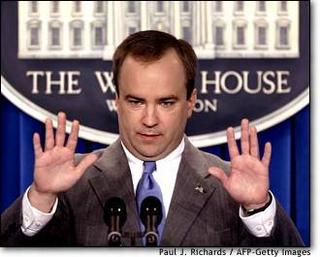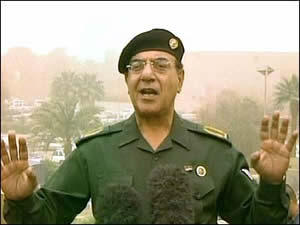
and this guy?

Let's try again:
"There are no American infidels in Baghdad. Never!"
or
Q Scott, why did the administration feel it was necessary to coach the soldiers that the President talked to this morning in Iraq?
MR. McCLELLAN: I'm sorry, I don't know what you're suggesting.
Q Well, they discussed the questions ahead of time. They were told exactly what the President would ask, and they were coached, in terms of who would answer what question, and how they would pass the microphone.
MR. McCLELLAN: I'm sorry, are you suggesting that what our troops were saying was not sincere, or what they said was not their own thoughts?
Q Nothing at all. I'm just asking why it was necessary to coach them.
MR. McCLELLAN: Well, in terms of the event earlier today, the event was set up to highlight an important milestone in Iraq's history, and to give the President an opportunity to, once again, express our appreciation for all that our troops are doing when it comes to defending freedom, and their courage and their sacrifice. And this is a satellite feed, as you are aware, and there are always technological challenges involved when you're talking with troops on a satellite feed like this. And I think that we worked very closely with the Department of Defense to coordinate this event. And I think all they were doing was talking to the troops and letting them know what to expect.
Q But we asked you specifically this morning if there would be any screening of questions or if they were being told in any way what they should say or do, and you indicated no.
MR. McCLELLAN: I don't think that's what the question was earlier today. I think the question earlier today was asking if they could ask whatever they want, and I said, of course, the President was — and you saw —
Q And I asked if they were pre-screened.
MR. McCLELLAN: You saw earlier today the President was trying to engage in a back-and-forth with the troops. And I think it was very powerful what Lieutenant Murphy was saying at the end of that conversation, when he was talking about what was going on in January, how the American troops and coalition forces were in the lead when it came to providing security for the upcoming election, an election where more than eight million Iraqis showed up and voted. It was a great success.
And he talked about how this time, when we had the preparations for the upcoming referendum this Saturday, you have Iraqi forces that are in the lead, and the Iraqi forces are the ones that are doing the planning and preparing and taking the lead to provide for their own security as they get ready to cast their ballots again.
Q But I also asked this morning, were they being told by their commanders what to say or what to do, and you indicated, no. Was there any prescreening of —
MR. McCLELLAN: I'm not aware of any such — any such activities that were being undertaken. We coordinated closely with the Department of Defense. You can ask if there was any additional things that they did. But we work very closely with them to coordinate these events, and the troops can ask the President whatever they want. They've always been welcome to do that.